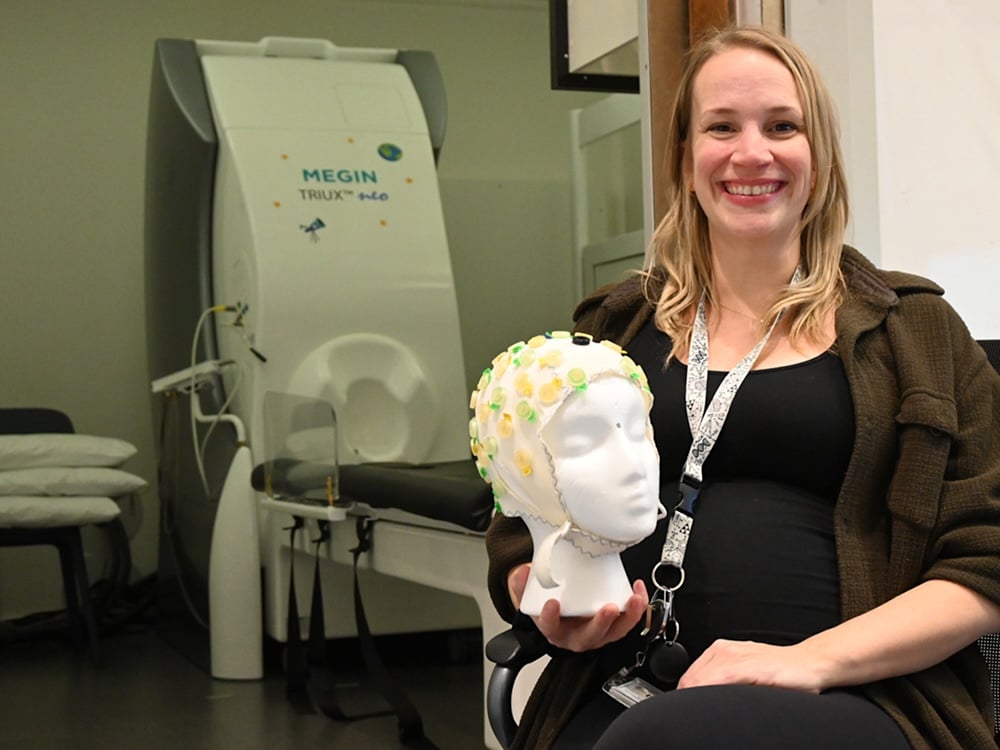Science
SFU Develops Innovative Mind-Mapping Machine for Epilepsy Care

Researchers at Simon Fraser University (SFU) are pioneering a new approach to epilepsy care with the development of a mind-mapping machine. This innovative device, known as the Magnetoencephalography (MEG) machine, captures non-invasive readings of electromagnetic fields while patients rest. The goal is to enhance diagnosis and treatment options for those living with epilepsy, a neurological disorder affecting millions worldwide.
The MEG machine works by measuring the magnetic fields produced by neuronal activity in the brain. Unlike traditional methods that often require invasive procedures, the MEG offers a safe and comfortable environment for patients. The readings are taken while individuals nap, allowing for a stress-free experience that can yield valuable data.
Research and Development at SFU
The development of the MEG machine is part of a broader initiative at SFU to advance neuroscience research. According to Dr. Linda McCarthy, a leading researcher in the project, “The MEG machine will provide us with unprecedented insights into brain activity during sleep, which is crucial for understanding epilepsy.” This new tool represents a significant leap forward in research capabilities, potentially leading to improved treatment protocols for epilepsy patients.
Funding for the project comes from a combination of university grants and partnerships with health organizations dedicated to neurological research. The initiative underscores SFU’s commitment to addressing pressing health challenges through innovative technology. By providing researchers with advanced tools like the MEG machine, the university aims to foster breakthroughs in understanding complex neurological conditions.
Potential Impact on Epilepsy Treatment
The implications of this technology extend beyond research. As the MEG machine becomes more widely available, it is expected to enhance clinical practices in epilepsy diagnosis and management. By accurately mapping brain activity, health professionals can tailor treatment plans to individual patients, potentially reducing the frequency and severity of seizures.
Epilepsy affects approximately 50 million people globally, leading to significant personal and societal challenges. The ability to monitor brain activity non-invasively offers hope for many who seek effective management of their condition. With advancements in technology, SFU’s MEG machine may soon play a pivotal role in changing the landscape of epilepsy care.
As the project progresses, SFU plans to collaborate with hospitals and epilepsy clinics across Canada to facilitate the integration of this technology into everyday clinical settings. Through these partnerships, the university aims to ensure that the benefits of the MEG machine reach those who need it most.
In summary, the development of the MEG machine at Simon Fraser University marks a significant step forward in epilepsy research and treatment. By combining cutting-edge technology with a patient-centered approach, SFU is poised to make a lasting impact on the lives of individuals living with epilepsy.
-

 Lifestyle2 months ago
Lifestyle2 months agoWinnipeg Celebrates Culinary Creativity During Le Burger Week 2025
-

 Health2 months ago
Health2 months agoMontreal’s Groupe Marcelle Leads Canadian Cosmetic Industry Growth
-

 Science2 months ago
Science2 months agoMicrosoft Confirms U.S. Law Overrules Canadian Data Sovereignty
-

 Education2 months ago
Education2 months agoRed River College Launches New Programs to Address Industry Needs
-

 Technology2 months ago
Technology2 months agoDragon Ball: Sparking! Zero Launching on Switch and Switch 2 This November
-

 Technology1 week ago
Technology1 week agoDiscord Faces Serious Security Breach Affecting Millions
-

 Science2 months ago
Science2 months agoTech Innovator Amandipp Singh Transforms Hiring for Disabled
-

 Technology2 months ago
Technology2 months agoGoogle Pixel 10 Pro Fold Specs Unveiled Ahead of Launch
-

 Science2 months ago
Science2 months agoChina’s Wukong Spacesuit Sets New Standard for AI in Space
-

 Technology2 months ago
Technology2 months agoWorld of Warcraft Players Buzz Over 19-Quest Bee Challenge
-

 Business2 months ago
Business2 months agoDawson City Residents Rally Around Buy Canadian Movement
-

 Technology1 week ago
Technology1 week agoHuawei MatePad 12X Redefines Tablet Experience for Professionals
-

 Education2 months ago
Education2 months agoAlberta Teachers’ Strike: Potential Impacts on Students and Families
-

 Business2 months ago
Business2 months agoNew Estimates Reveal ChatGPT-5 Energy Use Could Soar
-

 Science2 months ago
Science2 months agoXi Labs Innovates with New AI Operating System Set for 2025 Launch
-

 Technology2 months ago
Technology2 months agoInnovative 140W GaN Travel Adapter Combines Power and Convenience
-

 Technology2 months ago
Technology2 months agoFuture Entertainment Launches DDoD with Gameplay Trailer Showcase
-

 Technology2 months ago
Technology2 months agoGlobal Launch of Ragnarok M: Classic Set for September 3, 2025
-

 Technology2 months ago
Technology2 months agoNew IDR01 Smart Ring Offers Advanced Sports Tracking for $169
-

 Technology2 months ago
Technology2 months agoArsanesia Unveils Smith’s Chronicles with Steam Page and Trailer
-

 Science2 months ago
Science2 months agoNew Precision Approach to Treating Depression Tailors Care to Patients
-

 Business2 months ago
Business2 months agoBNA Brewing to Open New Bowling Alley in Downtown Penticton
-

 Technology2 months ago
Technology2 months agoHumanoid Robots Compete in Hilarious Debut Games in Beijing
-

 Health2 months ago
Health2 months agoGiant Boba and Unique Treats Take Center Stage at Ottawa’s Newest Bubble Tea Shop










